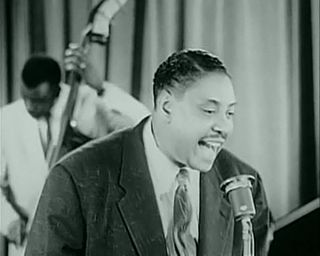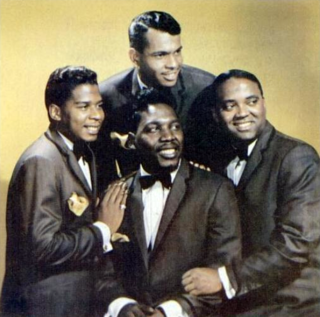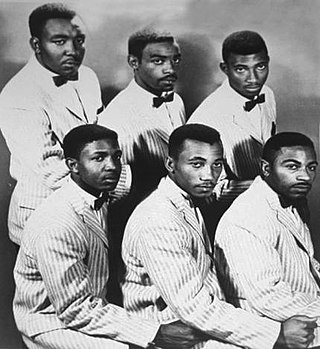
Rhythm and blues, frequently abbreviated as R&B or R'n'B, is a genre of popular music that originated within African-American communities in the 1940s. The term was originally used by record companies to describe recordings marketed predominantly to African Americans, at a time when "rocking, jazz based music ... [with a] heavy, insistent beat" was becoming more popular. In the commercial rhythm and blues music typical of the 1950s through the 1970s, the bands usually consisted of a piano, one or two guitars, bass, drums, one or more saxophones, and sometimes background vocalists. R&B lyrical themes often encapsulate the African-American history and experience of pain and the quest for freedom and joy, as well as triumphs and failures in terms of societal racism, oppression, relationships, economics, and aspirations.

Doo-wop is a subgenre of rhythm and blues music that originated in African-American communities during the 1940s, mainly in the large cities of the United States, including New York, Philadelphia, Pittsburgh, Chicago, Baltimore, Newark, Detroit, Washington, D.C., and Los Angeles. It features vocal group harmony that carries an engaging melodic line to a simple beat with little or no instrumentation. Lyrics are simple, usually about love, sung by a lead vocal over background vocals, and often featuring, in the bridge, a melodramatically heartfelt recitative addressed to the beloved. Harmonic singing of nonsense syllables is a common characteristic of these songs. Gaining popularity in the 1950s, doo-wop was "artistically and commercially viable" until the early 1960s and continued to influence performers in other genres.

The Drifters are an American doo-wop and R&B/soul vocal group. They were originally formed as a backing group for Clyde McPhatter, formerly the lead tenor of Billy Ward and his Dominoes in 1953. The second group of Drifters, formed in 1959 and led by Ben E. King, were originally an up-and-coming group named The Five Crowns. After 1965 members drifted in and out of both groups and many of these formed other groups of Drifters as well. Over the succeeding decades, several different bands, all called the Drifters, can trace roots back to these original groups, but contain few—if any—original members.

The Flamingos are an American doo-wop group formed in Chicago in 1953. The band became popular in mid-to-late 1950s and are known for their 1959 cover version of "I Only Have Eyes for You". They have since been hailed as one of the finest and most influential vocal groups in pop and doo wop music history. In 2001, the band was inducted into the Rock and Roll Hall of Fame.

The Teenagers were an American music group, most noted for being one of rock music's earliest successes, presented to international audiences by DJ Alan Freed. The group, which made its most popular recordings with young Frankie Lymon as lead singer, is also noted for being rock's first all-teenaged act. They were inducted into the Rock and Roll Hall of Fame in 1993.

The Dells were an American R&B vocal group. Formed in high school in 1953 by founding members Marvin Junior, Verne Allison, Johnny Funches, Chuck Barksdale, and Michael and Lucius McGill, under the name the El-Rays. They released their first recording in 1954 and two years later had their first R&B hit with "Oh What a Night". After disbanding due to a near-fatal car crash in 1958, the band re-formed in 1960 with Funches being replaced by Johnny Carter. This lineup remained together until Carter's death in 2009. In 2004 the Dells were inducted into both the Rock and Roll Hall of Fame and the Vocal Group Hall of Fame. The group performed until illness forced longtime lead singer Marvin Junior and bass vocalist Chuck Barksdale into retirement, ending the group's 60-year run.
Daniel Earl Rapp was an American singer and the frontman for the group Danny & the Juniors. The group is best known for their 1958 hit "At the Hop".

The Del-Vikings were an American doo-wop musical group that recorded several hit singles in the 1950s and continued to record and tour with various lineups in later decades. The group is notable for the hit songs "Come Go with Me" and "Whispering Bells", and for having been a successful racially mixed musical group during a period of time when such groups were rare.

Maurice Williams and the Zodiacs were an American doo-wop/R&B vocal group in the late 1950s and early 1960s. Originally the (Royal) Charms, the band changed its name to the Gladiolas in 1957 and the Excellos in 1958, before finally settling on the Zodiacs in 1959.

The Diamonds are a Canadian vocal quartet that rose to prominence in the 1950s and early 1960s with 16 Billboard hit records. The original members were Dave Somerville (lead), Ted Kowalski (tenor), Phil Levitt (baritone), and Bill Reed (bass). They were most noted for interpreting and introducing rhythm and blues vocal group music to the wider pop music audience. Contrary to a popular myth, the father of Tom Hanks was never a member of the group.

John Bartram High School is a public secondary school serving neighborhoods of the Southwest Philadelphia area of Philadelphia, Pennsylvania. The school, which serves grades 9 through 12, is a part of the School District of Philadelphia.

The Midnighters were an American vocal group from Detroit, Michigan. They were an influential group in the 1950s and early 1960s, with many R&B hit records. They were also notable for launching the career of lead singer Hank Ballard and the worldwide dance craze the Twist. Between 1953 and 1962 the Midnighters had several hits on the U.S. pop and R&B charts. Their hits included the million-selling Billboard Top 10 pop hits "Finger Poppin' Time", and "Let's Go, Let's Go, Let's Go". The Midnighters also had 13 top 10 R&B hits, including three that reached number 1. Their top 10 R&B hits included "Work with Me, Annie", "It's Love Baby ", "Annie Had a Baby", "The Hoochi Coochi Coo", "Teardrops on Your Letter", "Get It", "The Float" and "Nothing but Good". They received the Rhythm and Blues Foundation's prestigious Pioneer Award in 1992 and were inducted into the Vocal Group Hall of Fame in 1999. The Midnighters are also noted for achieving a music industry milestone in 1960, by becoming the first group in history to place 3 singles in the Billboard Hot 100 at the same time. The group's lead singer, Hank Ballard, was inducted into the Rock and Roll Hall of Fame in 1990. The Midnighters as a group were inducted into the Rock and Roll Hall of Fame on April 14, 2012.

"At the Hop" is a 1950s pop song written by Artie Singer, John Medora, and David White and originally released by Danny & the Juniors. The song was released in the fall of 1957 and reached number one on the US charts on January 6, 1958, becoming one of the top-selling singles of 1958. "At the Hop" also hit number one on the R&B Best Sellers list. Somewhat more surprisingly, the record reached #3 on the Music Vendor country charts. It was also a big hit elsewhere, which included a number 3 placing on the UK charts.

Billy Ward and his Dominoes were an American R&B vocal group. One of the most successful R&B groups of the early 1950s, the Dominoes helped launch the singing careers of two notable members, Clyde McPhatter and Jackie Wilson.
John L. Medora, also known as John or Johnny Madara, is an American singer, songwriter, composer and record producer best known to have teamed up with David White and Arthur Singer to write the 1957 hit song "At the Hop".
David Ernest White, also known as David White Tricker, was an American singer and songwriter. He formed the doo-wop quartet Danny & the Juniors, as well as being a founding member of the pop trio The Spokesmen. He wrote "Rock and Roll Is Here to Stay" and co-wrote a number of other hit songs, including "At the Hop", "You Don't Own Me", and "1-2-3".
The Spokesmen were an American pop music trio. They scored a hit single in the U.S. in 1965 with the tune "The Dawn of Correction", which was a partially sarcastic counterpoint and answer record to Barry McGuire's protest song, "Eve of Destruction". The song was written by the group's members, John Medora, David White, and Ray Gilmore, the latter a long time radio personality at WIBG (Wibbage) 990AM in Philadelphia, Pennsylvania. The tune hit #36 on the Billboard Hot 100 chart. They also released a remake of the Beatles' "Michelle" as a single on Decca Records that got significant airplay on WIBG.

Back to Front is the sixty-first studio album by American vocal group The Temptations. It was released by New Door Records on October 23, 2007. It contains mostly covers of songs that were hits for Stax Records artists, as well as other non-Motown artists. The album also includes covers of "Minute by Minute" by The Doobie Brothers and "How Deep Is Your Love" by The Bee Gees.

"(I'm a) Road Runner" is a hit song by Junior Walker & the Allstars, and was the title track of the successful 1966 album Road Runner. Written by the team of Holland–Dozier–Holland, it was released on the Tamla (Motown) label in 1966 and reached number 20 in the U.S. and in 1969 number 12 in the UK.














